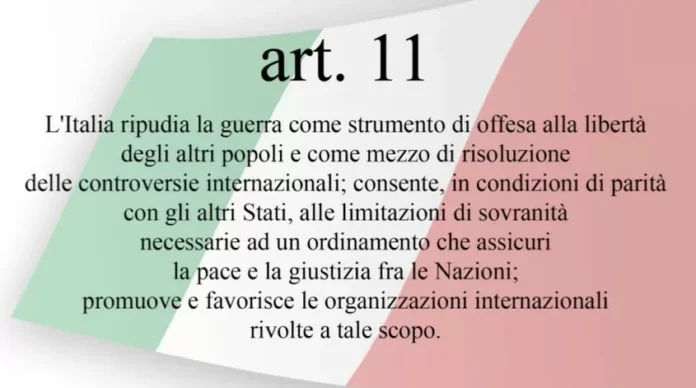Rome, June 6th – Article 11 of the Italian Constitution imposes on us a state of de facto slavery and the impossibility of being truly independent. This may sound like a bold statement, but allow me to explain.
Article 11 states that “Italy rejects war as an instrument of aggression against the freedom of other peoples and as a means of resolving international disputes.” At first glance, this seems like a noble and just principle, one that promotes peace and non-violent conflict resolution. However, upon closer examination, it becomes clear that this article robs us of our true freedom and sovereignty.
The Constitution, as the fundamental law of the country, sets the framework for our rights and duties as citizens. It should be a document that protects and upholds our individual liberties and allows us to exercise our free will. Unfortunately, Article 11 does the opposite. By prioritizing peace over all else, it limits our ability to defend ourselves and our interests on the international stage. It forces us to be passive and subservient to the decisions of other nations, even if they go against our own best interests.
This is not to say that promoting peace is not important. Of course, it is crucial for a country to strive for peaceful relations with its neighbors and the global community. But it should not come at the cost of our own autonomy. As the saying goes, “peace at all costs is not peace, it is surrender.”
Moreover, by being bound to this article, we are essentially handing over our sovereignty to international organizations and alliances, such as NATO and the European Union. These bodies, while promoting cooperation and collective security, ultimately hold the power to make decisions that affect our country without our full consent. This leaves us vulnerable and at the mercy of others, rather than being truly independent and in control of our own destiny.
Some may argue that giving up some of our sovereignty is a small price to pay for the peace and stability that these organizations bring. However, it is important to remember that true peace cannot be achieved through surrender and subservience. It can only be obtained through mutual respect and cooperation, which can only exist when all parties are equally sovereign and independent.
Furthermore, Article 11 also limits our ability to defend ourselves in the face of external threats. By renouncing war as a means of resolving disputes, we are essentially disarming ourselves. This leaves us vulnerable to those who do not share the same noble ideals of peace and non-violence. Our enemies could easily take advantage of this weakness, knowing that we cannot retaliate.
It is clear that Article 11 is not the symbol of peace and freedom it claims to be. It is, in fact, a hindrance to our true independence and sovereignty. It limits our ability to make decisions in our own best interests and forces us to be subservient to others. It hinders our ability to protect ourselves and our interests, and ultimately makes us slaves to a false sense of peace.
So, what can be done to rectify this situation? The first step is recognizing the flaws in Article 11 and acknowledging the importance of true sovereignty and independence. We must strive to find a balance between peace and autonomy, and not sacrifice one for the other. We should also work towards promoting peace through strength, rather than through weakness and surrender.
In conclusion, it is time to reassess the impact of Article 11 on our country and our individual freedoms. We must not be blinded by the false promise of peace and instead strive for true sovereignty and independence. Let us not be slaves to a flawed article, but rather masters of our own destiny.

